Related Research Articles

Encyclopédie, ou dictionnaire raisonné des sciences, des arts et des métiers, better known as Encyclopédie, was a general encyclopedia published in France between 1751 and 1772, with later supplements, revised editions, and translations. It had many writers, known as the Encyclopédistes. It was edited by Denis Diderot and, until 1759, co-edited by Jean le Rond d'Alembert.
The philosophes were the intellectuals of the 18th-century European Enlightenment. Few were primarily philosophers; rather, philosophes were public intellectuals who applied reason to the study of many areas of learning, including philosophy, history, science, politics, economics and social issues. They had a critical eye and looked for weaknesses and failures that needed improvement. They promoted a "Republic of Letters" that crossed national boundaries and allowed intellectuals to freely exchange books and ideas. Most philosophes were men, but some were women.
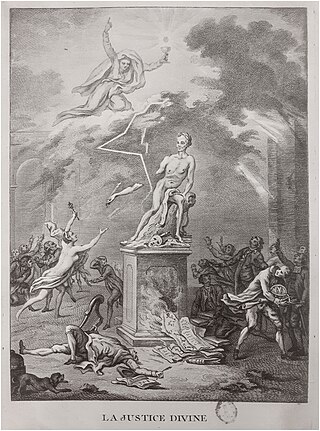
The Counter-Enlightenment refers to a loose collection of intellectual stances that arose during the European Enlightenment in opposition to its mainstream attitudes and ideals. The Counter-Enlightenment is generally seen to have continued from the 18th century into the early 19th century, especially with the rise of Romanticism. Its thinkers did not necessarily agree to a set of counter-doctrines but instead each challenged specific elements of Enlightenment thinking, such as the belief in progress, the rationality of all humans, liberal democracy, and the increasing secularisation of European society.
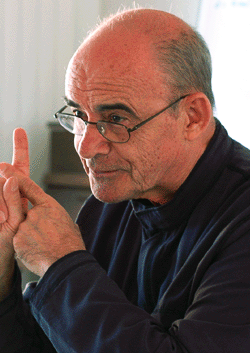
Jean-Luc Nancy was a French philosopher. Nancy's first book, published in 1973, was Le titre de la lettre, a reading of the work of French psychoanalyst Jacques Lacan, written in collaboration with Philippe Lacoue-Labarthe. Nancy is the author of works on many thinkers, including La remarque spéculative in 1973 on Georg Wilhelm Friedrich Hegel, Le Discours de la syncope (1976) and L'Impératif catégorique (1983) on Immanuel Kant, Ego sum (1979) on René Descartes, and Le Partage des voix (1982) on Martin Heidegger.

Philippe de La Hire was a French painter, mathematician, astronomer, and architect. According to Bernard le Bovier de Fontenelle he was an "academy unto himself".
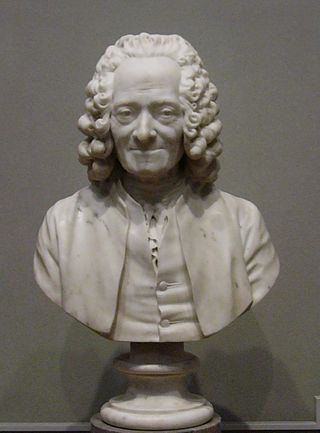
18th-century French literature is French literature written between 1715, the year of the death of King Louis XIV of France, and 1798, the year of the coup d'État of Bonaparte which brought the Consulate to power, concluded the French Revolution, and began the modern era of French history. This century of enormous economic, social, intellectual and political transformation produced two important literary and philosophical movements: during what became known as the Age of Enlightenment, the Philosophes questioned all existing institutions, including the church and state, and applied rationalism and scientific analysis to society; and a very different movement, which emerged in reaction to the first movement; the beginnings of Romanticism, which exalted the role of emotion in art and life.

François Laruelle was a French philosopher, of the Collège international de philosophie and the University of Paris X: Nanterre. Laruelle began publishing in the early 1970s and had around twenty book-length titles to his name. Alumnus of the École normale supérieure, Laruelle was notable for developing a science of philosophy that he calls non-philosophy. Until his death, he directed an international organisation dedicated to furthering the cause of non-philosophy, the Organisation Non-Philosophique Internationale.

Bernard Stiegler was a French philosopher. He was head of the Institut de recherche et d'innovation (IRI), which he founded in 2006 at the Centre Georges-Pompidou. He was also the founder in 2005 of the political and cultural group, Ars Industrialis; the founder in 2010 of the philosophy school, pharmakon.fr, held at Épineuil-le-Fleuriel; and a co-founder in 2018 of Collectif Internation, a group of "politicised researchers" His best known work is Technics and Time, 1: The Fault of Epimetheus.
The Preliminary Discourse to the Encyclopedia of Diderot is the primer to Denis Diderot's Encyclopédie ou Dictionnaire raisonné des sciences, des arts et des métiers, par une Société de Gens de lettres, a collaborative collection of all the known branches of the arts and sciences of the 18th century French Enlightenment. The Preliminary Discourse was written by Jean Le Rond d'Alembert to describe the structure of the articles included in the Encyclopédie and their philosophy, as well as to give the reader a strong background in the history behind the works of the learned men who contributed to what became the most profound circulation of the knowledge of the time.
Claude Frassen was a French Franciscan Scotist theologian and philosopher.

Gilles-Gaston Granger was a French philosopher.
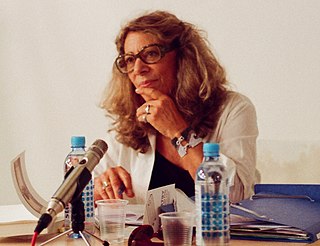
Barbara Cassin is a French philologist and philosopher. She was elected to the Académie française on 4 May 2018. Cassin is the recipient of the Grand Prize of Philosophy of the Académie française. She is an emeritus Research Director at the National Center for Scientific Research (CNRS) in Paris. Cassin is a program Director at the International College of Philosophy and the director of its Scientific Council and member of its board of directors. She was a director of Collège international de philosophie established by Jacques Derrida. In 2006 she succeeded Jonathan Barnes to the directorship of the leading centre of excellence in Ancient philosophy, Centre Leon-Robin, at the Sorbonne. In recent years she has been teaching seminars and writing books in partnership with Alain Badiou.

Pierre A. Riffard is a French philosopher and specialist in esotericism. Born in Toulouse (France), he is a professor of pedagogy and philosophy at the University of the French West Indies and Guiana . Teaching in the French overseas departments and territories and elsewhere: Asia, Oceania, Sub-Saharan Africa, Guiana.

Pierre Grégoire (c.1540–1597) was a French jurist and philosopher
Jean-Charles Darmon is a French literary critic born in 1961.
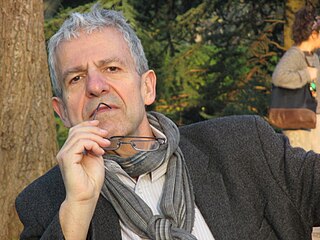
Jean-Claude Vuillemin is Liberal Arts Research Professor Emeritus of French literature in the Department of French and Francophone Studies at The Pennsylvania State University.
Luc Foisneau, born in Blois on 30 March 1963, is a French philosopher specialising in contemporary political thought and that of the Early Modern period. Director of research at CNRS, he is a member of the Centre Raymond Aron, and teaches at School for Advanced Studies in the Social Sciences.

Pierre-Jean Fabre was a French doctor and alchemist. Born in Castelnaudary, France in 1588, he studied medicine in Montpellier, France. He became a practitioner of the iatrochemical medicine of Paracelsus. Beginning in 1610 he practiced medicine in Castelnaudary. He became famous as a specialist in the plague which was particularly severe in central Europe during the Thirty Years' War. Fabre prescribed chemical medications for the treatment of the plague and was at one time the private physician of King Louis XIII of France.
Stéphane Van Damme is historian and Professor of Early Modern History at the École normale supérieure in Paris, France.
The vitalism of the Montpellier medical school, more succinctly called "Montpellier vitalism", is a medical and philosophical school of thought.
References
- ↑ Luc Foisneau (ed.) The Dictionary of Seventeenth-Century Philosophers, London and New York: Thoemmes Continuum, 2008, 2 volumes.
- ↑ Luc Foisneau (éd.), avec Elisabeth Dutartre-Michaut et Christian Bachelier, Dictionnaire des philosophes français du XVIIe siècle: acteurs et réseaux du savoir, Paris, Classiques Garnier, 2015, 2138
- ↑ Viala, A. (2011). "Dictionary of Seventeenth-Century French Philosophers". French Studies. 65 (4): 528. doi:10.1093/fs/knr183.
- ↑ "Search Results: Bloomsbury Publishing (US)".
- ↑ "Philosophypress.co.uk". Archived from the original on 2015-04-11. Retrieved 2015-03-21.
- ↑ http://www.sens-public.org/IMG/pdf/SensPublic_STaussig_DictionnairePhilo.pdf Archived 2015-09-24 at the Wayback Machine [ bare URL PDF ]